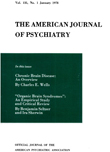RESULTS OF SIMULTANEOUS ABRUPT WITHDRAWAL OF ATARAXICS IN 500 CHRONIC PSYCHOTIC PATIENTS
Abstract
It is our opinion that the sudden withdrawal of tranquilizers from chronic psychotics living in a protective and reasonably permissive ward atmosphere will do no apparent harm to their condition in the majority of patients for a period ranging up to 5 months. Withdrawal symptoms were few, mild, and easily controlled, and asocial conduct usually subsided readily when the drugs were readministered. Drug intake as measured by duration, or dosage, or type of drug does not seem to be a factor as to how long a case can remain off medication socially. Neither do diagnosis, or apparent duration of illness, or age, except that those within the geriatric period seemed to remain off medication for the 90-day period in somewhat larger percentage. The results of this experiment seem to confirm a 1954 study(2) by a group at this hospital which found that clinical response and the pattern of resistive isolation in the Lorr Scale were the main improvements to be expected following the use of chlorpromazine and reserpine–and the present authors feel that this may well be true of all tranquilizers on this type of patient.
Access content
To read the fulltext, please use one of the options below to sign in or purchase access.- Personal login
- Institutional Login
- Sign in via OpenAthens
- Register for access
-
Please login/register if you wish to pair your device and check access availability.
Not a subscriber?
PsychiatryOnline subscription options offer access to the DSM-5 library, books, journals, CME, and patient resources. This all-in-one virtual library provides psychiatrists and mental health professionals with key resources for diagnosis, treatment, research, and professional development.
Need more help? PsychiatryOnline Customer Service may be reached by emailing [email protected] or by calling 800-368-5777 (in the U.S.) or 703-907-7322 (outside the U.S.).



